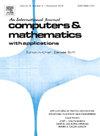二维泊松方程的最低阶稳定自由虚拟元素法
IF 2.9
2区 数学
Q1 MATHEMATICS, APPLIED
引用次数: 0
摘要
我们分析了针对泊松问题的一阶扩大增强虚拟元素法(E2VEM)。由于利用了高阶多项式投影,通过适当扩大局部虚拟空间的增强特性(前缀 E2 即由此而来),该方法允许定义不需要稳定项的双线性形式。我们提供了一个充分条件,以实现问题解决和最优阶先验误差估计。我们介绍了对凸和非凸多边形网格的数值测试,证实了该方法的稳健性和理论收敛率。本文章由计算机程序翻译,如有差异,请以英文原文为准。
Lowest order stabilization free virtual element method for the 2D Poisson equation
We analyze the first order Enlarged Enhancement Virtual Element Method (E2VEM) for the Poisson problem. The method allows the definition of bilinear forms that do not require a stabilization term, thanks to the exploitation of higher order polynomial projections that are made computable by suitably enlarging the enhancement property (from which comes the prefix E2) of local virtual spaces. We provide a sufficient condition for the well-posedness and optimal order a priori error estimates. We present numerical tests on convex and non-convex polygonal meshes that confirm the robustness of the method and the theoretical convergence rates.
求助全文
通过发布文献求助,成功后即可免费获取论文全文。
去求助
来源期刊

Computers & Mathematics with Applications
工程技术-计算机:跨学科应用
CiteScore
5.10
自引率
10.30%
发文量
396
审稿时长
9.9 weeks
期刊介绍:
Computers & Mathematics with Applications provides a medium of exchange for those engaged in fields contributing to building successful simulations for science and engineering using Partial Differential Equations (PDEs).
 求助内容:
求助内容: 应助结果提醒方式:
应助结果提醒方式:


